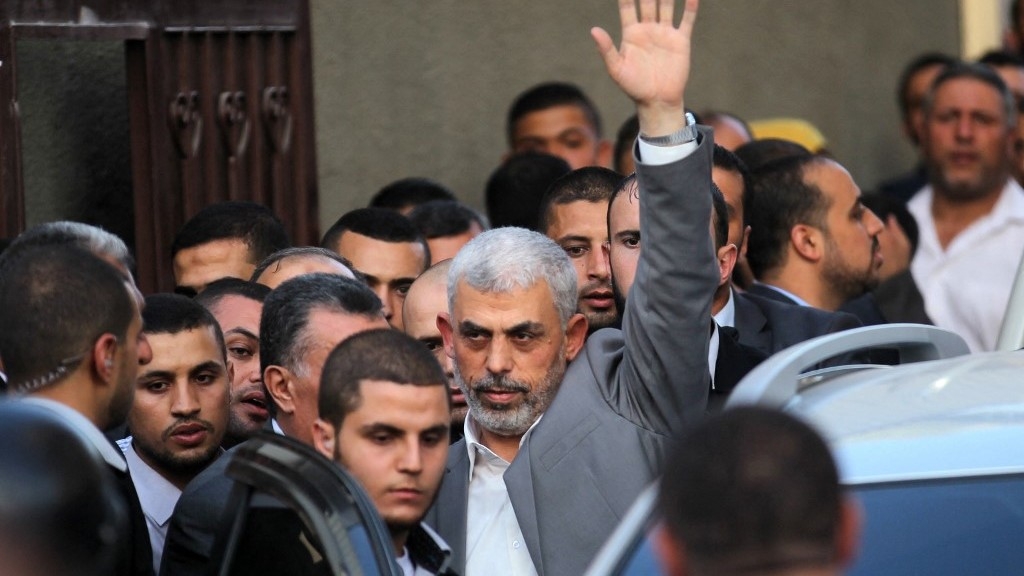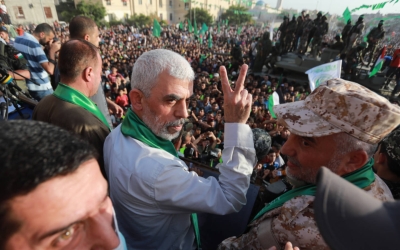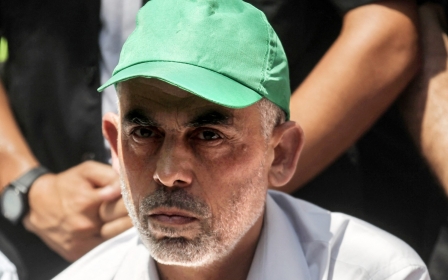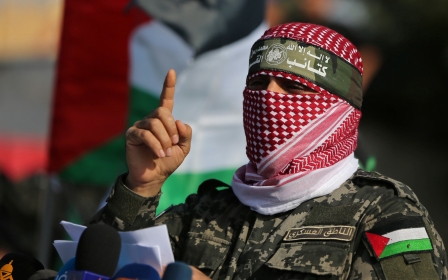Yahya Sinwar's killing will complicate Israel's war on Gaza, not end it

Israeli analysts say the assassination of Yahya Sinwar is unlikely to bring Israel’s war on Gaza to an end and will likely put the 101 hostages held in the enclave in even greater danger.
There has been speculation that the Hamas leaders’ killing has left an opportunity for Prime Minister Benjamin Netanyahu, under American pressure, to declare victory, strike a ceasefire deal and bring the hostages home.
This might have been possible several months ago, but the war on Gaza has now shape-shifted, Israeli journalist and analyst Meron Rapoport told Middle East Eye.
“The elimination of Hamas and the return of the hostages was not the goal of the war in recent times,” Rapoport said.
“The goal is to change the borders of the Gaza Strip and to eliminate Palestinian nationalism in Gaza and transfer as many people as possible.”
New MEE newsletter: Jerusalem Dispatch
Sign up to get the latest insights and analysis on Israel-Palestine, alongside Turkey Unpacked and other MEE newsletters
Over the past two weeks, Israeli forces have ordered hundreds of thousands of people to leave northern Gaza, cut off aid from entering the area, and launched a new offensive on those who remain.
Analysts like Rapoport say the Israeli military is carrying out the controversial “General’s Plan”, also known as the Eiland Plan, which calls for the ethnic cleansing of northern Gaza.
Now underway, the military might be impossible to stop even if Prime Minister Benjamin Netanyahu wanted to end the war right now, Rapoport said.
'The road back from this war is very complex. A dynamic has developed that the army itself will find difficult to stop'
- Meron Rapoport, Israeli journalist
“The road back from this war is very complex. A dynamic has developed that the army itself will find difficult to stop,” he said.
Along with parts of the army, the powerful right-wing figures in Netanyahu’s government will “want to complete the bigger plan regarding Gaza”.
Hamas said on Friday that the Israeli hostages will not be released until the war ends and Israel withdraws from Gaza. But experts have told MEE that the “General’s Plan” will leave northern Gaza under Israeli occupation indefinitely.
Writing in the Marker, Avi Bar-Eli analysed comments Netanyahu made after Sinwar's killing - comments like "the mission ahead of us has not yet been completed" and that "this is the beginning of the day after Hamas " - and argued that the assassination will not end the war.
"The elimination is but one stage in the campaign whose future is still ahead," Bar-Eli wrote.
Basic questions
There are also basic questions about who Israel will now negotiate with, what position Sinwar’s replacement and that of the entire Hamas leadership will be towards those talks, and if his yet-to-be-named successor can deliver the hostages.
“It is not clear if [the new leader] will even be able to reach all the abductees and their captors, decide what will be done with them and prevent anarchy,” wrote journalist Jonathan Lees in Haaretz on Friday.
Israeli Hayom correspondent Shahar Kleiman said while it was unclear how Hamas would approach negotiations moving forward, the hostage deal depended on Netanyahu's government.
"In the end, the decision depends on Netanyahu's government. There, as we know, are ministers who oppose almost every deal, even the one that took place in November," Kleiman wrote.
Former senior Israeli Air Force official Zvika Haimovich said on Friday that Sinwar's killing has raised more questions than it answers, including whether an attack on Iran is now necessary and if conditions for the 101 hostages remaining in Gaza will improve.
Family members of the hostages believe the answer to that is a clear "no", and demanded that a deal be pushed forward quickly, expressing "grave concern" for their relatives.
Einav Zangauker, a mother of one of the hostages, told Israel Hayom: "We closed the account with the mass murderer Sinwar, but now, more than ever, the lives of my son, Matan, and the other hostages are in tangible danger.
"Netanayhu, don't busy the hostages. Go out now to the mediators and the public and lay out a new Israeli initiative."
Rapoport said ending the fighting and returning the hostages has been in Israel's hands since January. Hamas would have "long ago" agreed to the return hostages in exchange for prisoners and a ceasefire, he said.
"But I think the dynamics of the constant war, both in Gaza and in Lebanon and Iran, enchants [Netanyahu] and also enchants the army as long as there is no economic collapse," he said.
"We may have reached some point where Netanyahu says this is how we should live."
Middle East Eye delivers independent and unrivalled coverage and analysis of the Middle East, North Africa and beyond. To learn more about republishing this content and the associated fees, please fill out this form. More about MEE can be found here.





